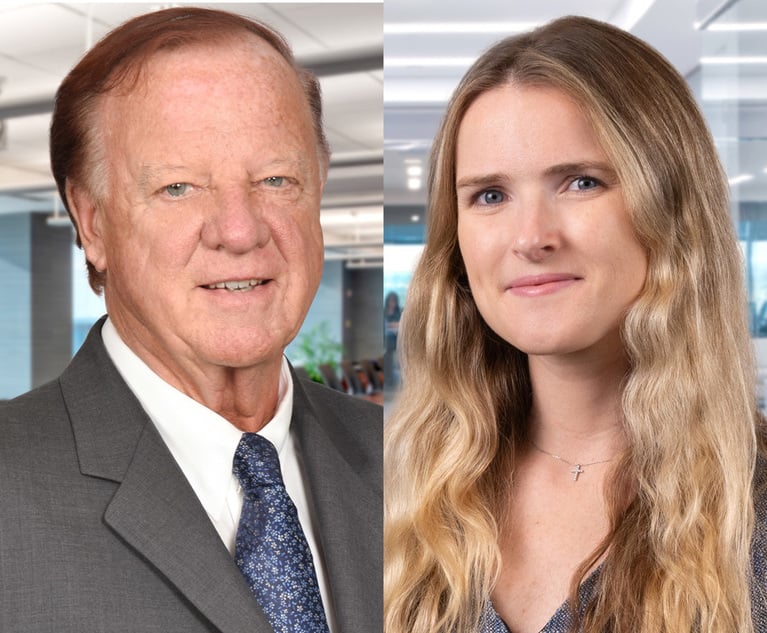
March 01, 2024 | New York Law Journal
The Unique Role of Counsel for Religious OrganizationsCounsel for religious organizations should be intimately familiar with the foundational principles of religion law to better advise the client in both transactional and litigation matters.
By Barry Black and Christopher Byrnes
9 minute read

March 01, 2024 | New York Law Journal
Continuation of a Business of a DecedentA fiduciary does not have automatic authority under EPTL §11-1.1 to continue a business of a decedent, incur obligations and thus render the estate liable. However, courts have stated that a fiduciary has an inherent authority to temporarily continue a business for the limited exceptions of converting business assets to cash for the benefit of the estate.
By C. Raymond Radigan and Tara E. Mahon
8 minute read

March 01, 2024 | New York Law Journal
The Increasing AI Disruption of CybersecurityArtificial intelligence has been disrupting cybersecurity prevention, regulatory compliance and security incidents management. In this article, Cathy Mulrow-Peattie discusses how companies can practically respond to these increasing AI disruptions.
By Cathy Mulrow-Peattie
8 minute read

March 01, 2024 | New York Law Journal
Preparing for the Expected and the Unexpected: The New York Department of Financial Services' Cybersecurity RegulationWhile the sufficiency of cybersecurity programs was previously subject to "reasonableness" standards, an "acceptable" cybersecurity program has become more objective as regulators, such as NYDFS, continue to implement, amend and mature applicable laws.
By Dan Pepper and Kate Nelson
9 minute read

March 01, 2024 | New York Law Journal
Conned by ChatGPT: The Growing Risks of AI-Powered Cyber AttacksIn this article, David Owen and Alexa Moses discuss new risks posed by AI-powered social engineering attacks, as well as several countermeasures individuals and companies can take to defend against them.
By David Owen and Alexa Moses
8 minute read

February 29, 2024 | New York Law Journal
Supreme Court To Decide Scope of Key Federal Corruption StatuteSection 666 of Title 18 has become one of the most important legal tools used in the federal prosecution of state and local corruption. It will soon be taken up by the Supreme Court. This article discusses another important federal anti-corruption statute, 18 U.S.C. §201. It then describes the competing interpretations of Section 666 and concludes with comments on the implications of a Supreme Court decision in 'United States v. Snyder'.
By Elkan Abramowitz and Jonathan Sack
10 minute read

February 29, 2024 | New York Law Journal
Issues Under the Corporate Transparency Act for TrustsOn Jan. 1, 2024, the Corporate Transparency Act (CTA) came into force, requiring the vast majority of small limited liability companies, corporations…
By Andrew Shore
9 minute read

February 29, 2024 | New York Law Journal
The CFPB Limits Intra-Agency Appeal RightsThe CFPB adopted a new intra-agency appeals process on Feb. 22, 2024. While the CFPB described its new rules as resulting from its review of revisions that other regulators have made to their intra-agency appeals processes over the past decade, the rules are most noteworthy for how they deny rights that other regulators of financial institutions provide.
By Jeffrey Alberts
7 minute read

February 28, 2024 | New York Law Journal
NYS Proposed Bill To Require Enhanced Public Participation Plans for Major Projects: Will It Pass This Time Around?Last year, New York Senator Jessica Ramos introduced S. 2510-A, which would require all major projects located in or adjacent to a "disadvantaged community" to submit a written enhanced public participation plan to NYSDEC as part of the proposed project's permitting process. This article summarizes the bill's requirements and explores both the benefits and drawbacks of the bill as currently drafted.
By Gail Suchman, Eva Schneider and Samuel Zarkower
6 minute read

February 28, 2024 | New York Law Journal
CPLR 2106 Amended To Permit Any Person To Submit Affirmation in Lieu of AffidavitIn the first of this two-part New York Practice column, Patrick M. Connors discusses how, effective Jan. 1, 2024, CPLR 2106 was substantially amended to allow any person to submit an affirmation in lieu of an affidavit, "with the same force and effect." This is one of the most significant changes to the CPLR in the 21st century and will impact many areas of practice.
By Patrick M. Connors
11 minute read
Trending Stories
- 1With a 7-Figure Book Deal and TV Adaptation on the Way, This Dechert Associate Remains Committed to Her Day Job
- 2Northwestern University Pritzker Law School Hit With Reverse Discrimination Lawsuit
- 3Biden Will Be First Lawyer-President Without a JD From the 'T-14' in a Century
- 4The Week in Data: A Look at Legal Industry Trends by the Numbers
- 5Settlement reached in lawsuit over death of clerk prior to $51 million jury award
More from ALM
- Morgan & Morgan Class Action Attorneys Detail Pathway to Success Within Cybersecurity and Data Privacy Practice 1 minute read
- Holwell Shuster & Goldberg Partners Leverage 'Hostile' Witnesses to Secure $101 Million Verdict Against Walmart 1 minute read
- Legal Speak at General Counsel Conference Midwest 2024: Mike Andolina, Partner, White & Case 1 minute read



